Books: The Next Best Thing
Books of the Great Ecclesiastical Designers
With October quickly speeding by, the date is fast approaching for those who can attend the Giants of Gothic Revival at the Victoria and Albert Museum scheduled for Saturday, October 25, 2014. This promises to be a wonderful event, but sadly, there is an ocean, and half a continent between the Museum and I. The chances of attending are non-existent. What is The Next Best Thing? Having a new book, or even two, or three on the Giants will have to suffice, along with searching the Internet for photos and background information.
Taking a peak through the Amazon and Abe Books wishlist produced several promising volumes on the Ecclesiastical Embroidery topics outlined for discussion at the Victoria and Albert Museum. A few have arrived, and one or two are on their way. There are also several volumes on my bookshelf to pull out, enjoy, and immerse oneself in the Ecclesiastical Giants.
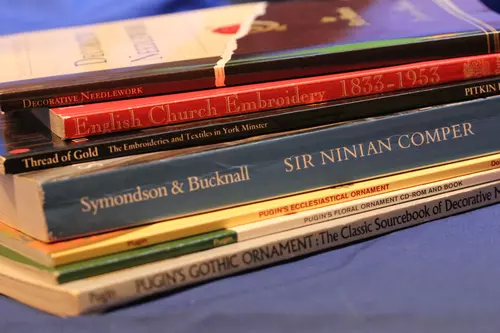
Where to begin? The V & A list of Giants starts with Pugin – Augustus Welby Northmore Pugin. A quick review of the bookshelves revealed four Pugin titles. Three of the titles are credited to Augustus Welby Northmore Pugin. The remaining title Pugin’s Gothic Ornament is credited to August Charles Pugin, his father
Augustus Pugin Book Design
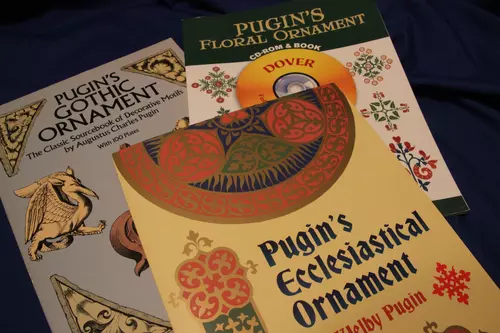
Pugin’s Gothic Ornament is a wood and stone carver’s paradise of delights. The book contains patterns for a wealth of designs from beasts to florals to leaves and even brass figures for tombs. Although the designs are intended for carving and not for Ecclesiastical Embroidery, with a little imagination, there are elements from the designs that could be incorporated into Ecclesiastical Embroidery Designs.
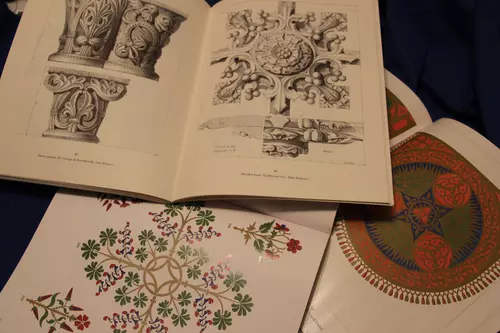
Pugin’s Floral Ornament is a book and CD-ROM combination. The designs can be pulled directly from the disk and incorporated into design work. The description reads:
This full-color collection of delicate floral and foliated designs was conceived by
the foremost English architect and designer of the early nineteenth century. Based on “flat”
patterns of the Middle Ages, the attractive motifs are easily adaptable for use
as stencil designs as well as patterns for wallpaper, carpets, stained glass, and tiles.
With a little creative thought, one can adapt motifs for use in Ecclesiastical and Church Embroidery Designs as well.
The final book from the above titles is a collection of colored Plates from Augustus Pugin’s Ecclesiastical Ornaments. These are stunning designs. The color plates are not intended to be working patterns for Ecclesiastical Embroidery. It would take some work to translate a design from a colored plate to a working Ecclesiastical Embroidery Pattern, but it would be fun to try. To get an idea of what a finished piece from Pugin’s Ecclesiastical Ornaments might look like, take a look at a few vestment pieces in the Victoria and Albert Museum Collection:
Pugin Burse and Pugin Cope and Hood
The final volume on my shelf relating to Pugin is the Glossary of Ecclesiastical Ornament and Costume, Compiled from Ancient Authorities and Examples.
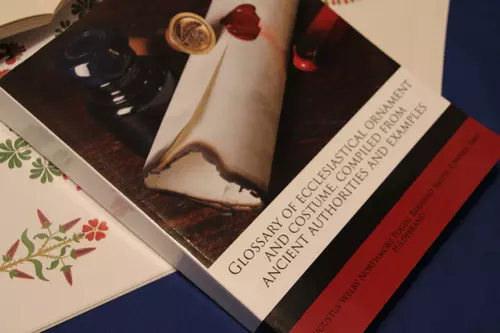
Exploring Pugin’s Glossary for Rich Insights
Available as a reprint of the original work and also available online at Internet Archives, this volume provides a detailed listing of many Ecclesiastical Terms. One example of the usefulness of the book was in providing a definition of the term Gremial. I came across the term while volunteering at a Monastery, assisting with cataloging their Ecclesiastical Embroidery Patterns. One box had special patterns used for bishops. In the box were patterns for various miters, gloves, sandals, and several patterns for Gremials. Luckily, I had Pugin’s Glossary book with me on that day, and we soon discovered the answer and use for Gremial: a silken apron, placed on the lap of a bishop, in sacred functions, when sitting, to minister holy Sacraments, with the Chrism.
The Gremial embroidery designs were stunning pieces of work. They had elaborate details and borders surrounding the bishop’s coat of arms. How fun it would be to see an actual sample of a Gremial. And, how wonderful it was for Pugin to compile such a complete listing of Ecclesiastical Ornaments. He was one of the Giants!
Coming up, are more Giants, and updates on the Rose Vestments.
Postings may be somewhat hit-and-miss for the next few days while the computer is sent off for repairs. My apologies for any slowness in posting new articles. I’ll be back to full force with the return of the computer.
Solo Dei Gloria
Be sure to visit our online store front Ecclesiastical Sewing where you may shop for Liturgical Fabrics, altar linen fabrics, church vestment-making patterns, liturgical machine embroidery designs, church vestment trims and notions and so much more. You may also find us on Ecclesiastical Sewing on Facebook, Twitter, and Pinterest. Sign up for our mailing list at the bottom of the page on our online store front and receive a free copy of our Small Linens Booklet as our way of saying thank you for following along.
Orphrey Bands for Pastoral Stoles
The Process of Making Vintage Embroidery Patterns Usable
Books: The Next Best Thing Part III
Books: The Next Best Thing : Part II
Sir Ninian Comper: Ecclesiastical Embroidery Designer
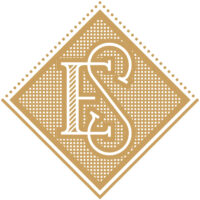





 RSS - Posts
RSS - Posts
Hi Carrie,
Great article but I have a question on ecclesiastical books that you have discussed here and previously and book reviews that I have read elsewhere: how do I determine which books pertain to Roman Catholic tradition and which pertain to other traditions, for example Anglican?
Thank you for sharing in your knowledge and experience!
Elizabeth
Hi Elizabeth,
Thank you for your kind words. I am actually LCMS – Lutheran. So, for those traditions which pertain to Roman Catholic or Anglican, I’m not certain I can answer that. What may help is knowing a little background information for an author. Augustus Pugin was raised as a Scottish Presbyterian, and later converted to Roman Catholic, but he designed for both Anglican and Roman Catholic Churches.
Most of the books I have read cover the topics relating to church work in a more “general” fashion. With regards to things such as Liturgical colors, there are some charts available explaining the differences in colors used by different churches: the Sarum Colors, and the colors of the Roman Rite might be a starting point. There is a little article “THE SARUM USE By the Reverend Canon Professor J. Robert Wright” which might aid in understanding where the differences between the Anglicans and Roman Catholic Traditions began.
For the most part, The LCSM follows the Roman Rite with regards to colors and most vestments. Differences come in to play with regards to symbols and the additional vestment pieces used as part of a High mass Set. When it gets to more specific questions, I usually collect the information in doubt and ask my Pastor.
Best regards,
Carrie